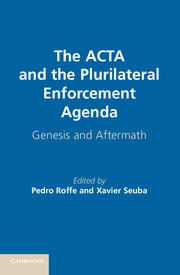Book contents
- Frontmatter
- Contents
- List of Contributors
- Foreword
- Acknowledgments
- Acronyms
- Introduction
- PART I THE FINAL ACT: ITS MAIN FEATURES AND CONTENTS
- 1 An Overview of the Agreement
- 2 ACTA Initial Provisions and General Definitions
- 3 ACTA General Obligations with Respect to Enforcement
- 4 Provisions on Civil Enforcement – Section 2 of ACTA
- 5 Legal Framework for Enforcement
- 6 ACTA and Beyond
- 7 ACTA’s Digital Chapter
- 8 The ACTA Committee
- PART II DOMESTIC LEGISLATIVE CHALLENGES
- PART III IMPACT ON RELATED PROCESSES
- PART IV VIEWS FROM STAKEHOLDERS: LESSONS
- PART V WHAT LIES AHEAD ACTA
- Annex I Anti-Counterfeiting Trade Agreement
- References
- Index
- References
3 - ACTA General Obligations with Respect to Enforcement
Published online by Cambridge University Press: 05 December 2014
- Frontmatter
- Contents
- List of Contributors
- Foreword
- Acknowledgments
- Acronyms
- Introduction
- PART I THE FINAL ACT: ITS MAIN FEATURES AND CONTENTS
- 1 An Overview of the Agreement
- 2 ACTA Initial Provisions and General Definitions
- 3 ACTA General Obligations with Respect to Enforcement
- 4 Provisions on Civil Enforcement – Section 2 of ACTA
- 5 Legal Framework for Enforcement
- 6 ACTA and Beyond
- 7 ACTA’s Digital Chapter
- 8 The ACTA Committee
- PART II DOMESTIC LEGISLATIVE CHALLENGES
- PART III IMPACT ON RELATED PROCESSES
- PART IV VIEWS FROM STAKEHOLDERS: LESSONS
- PART V WHAT LIES AHEAD ACTA
- Annex I Anti-Counterfeiting Trade Agreement
- References
- Index
- References
Summary
Introduction
The Anti-Counterfeiting Trade Agreement (ACTA) is a plurilateral agreement that establishes new international standards for the enforcement of intellectual property rights. Most of its substantive provisions can be found in Chapter II, which opens with a section on general obligations, followed by sections on civil, administrative and criminal enforcement, and a more innovative section on enforcement in the digital environment.
Section 1 of Chapter II contains a single key provision: Article 6 on general obligations with respect to enforcement. It (1) announces the competing legal interests at stake, namely intellectual property enforcement, free trade and protection from abuse; (2) commands the respect of fundamental due process principles, invoking fairness and equity; (3) and lays down an overarching proportionality principle.
Given its content and location, Article 6 should play a decisive and horizontal interpretative function, but it is not the only point of reference when looking for provisions protecting very basic legal interests. In effect, it is closely related to some of the treaty’s initial provisions, which also stipulate that broad principles and fundamental rights will be taken into consideration when implementing and interpreting the agreement. In a similar way, some articles in other parts of the treaty reinforce the importance given to the protection of several human rights, such as the rights to privacy, fair process and freedom of expression.
- Type
- Chapter
- Information
- The ACTA and the Plurilateral Enforcement AgendaGenesis and Aftermath, pp. 66 - 79Publisher: Cambridge University PressPrint publication year: 2014



